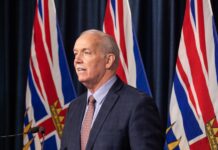PREMIER John Horgan on Tuesday released the following statement in response to the United States Department of Commerce’s (US DOC) first administrative review of softwood lumber duties on Canadian exports to the U.S.:
“Today, we received welcome news in our work to protect British Columbia jobs and communities that rely on export of lumber to the U.S.
“We have always known that the duties imposed by the United States were unfair and unwarranted, and the release today of the final results of the US DOC’s first administrative review of duties on softwood lumber significantly reduced the rates Canadian companies must pay to export to the U.S.
“Going forward, most B.C. companies will pay around 9% on shipments to the U.S., down from the current rate of 20.23%.
“While this reduction in duties will bring much needed relief to our industry, any duties applied to our softwood lumber exports to the U.S. are unjustified.
“This is only one piece in the ongoing softwood lumber dispute and resolving it is our top trade priority. We will fight alongside Canada, on behalf of British Columbians and the communities that rely on the forest sector, as we continue to challenge these unfair tariffs through World Trade Organization and North America Free Trade Agreement appeals processes.”
SUSAN Yurkovich, President of the BC Lumber Trade Council, said: “While the reduction in duty rates from this first Administrative Review is a step in the right direction, the fact that we’re still paying duties on our lumber products sold to the U.S. market is both frustrating and disappointing. As we have consistently said, and as has been proven in previous rounds of litigation, the Canadian industry is not subsidized, and this trade action leveled by U.S. producers is completely without merit.
“The North American lumber market is served by both American and Canadian producers. This has been important as, for many years, U.S. demand has outpaced domestically produced supply. Today, lumber demand is strong as families across the U.S. are looking to repair and remodel their homes, and others are driving demand for new home construction. That’s why it is so unfortunate that the ongoing actions of the U.S. industry resulting in these unwarranted tariffs are placing an added cost burden on consumers.
“Our strong hope is that the U.S. industry will end this decades-long litigation and instead work with us to further grow demand for the low-carbon wood products the world wants. Until then, we will continue to vigorously defend our industry against these baseless allegations.”
The Council said that B.C. is the largest Canadian exporter of softwood lumber to the U.S. The B.C. forest industry is a major contributor to the provincial economy and supports approximately 100,000 direct and indirect jobs in the province.














Hello- just looking for clarification- “Forestry GDP is about 2.69%. last year,”… is that really considered a ‘major contribution ‘ to our provincial economy? seems pretty minor. Without doing near as much permanent damage to our biodiversity, ecosystems, old-growth tourism, salmon, caribou, drinking water, or flood controls, little bitty Vancouver international Airport contributes almost as much! And With OUT SUCH A MASSIVE DESTRUCTIVE, UNSUSTAINABLE FOOTPRINT. The B.C. Forest Industry is a cornerstone of the provincial economy, generating an estimated $12.9 billion contribution to the total provincial GDP you say. YET-Through YVR’s operations, as well as tourism and cargo, it helps facilitate $20.2 billion in total economic output and $10.4 billion in total GDP across B.C. Both of these statistics have gone up by 20 percent since the last study conducted in 2015. YVR also helped contribute $1.4 billion in total government revenue. Maybe it is no longer economically viable to log the way we used to log? It certainly is not ecologically viable, and BC residents know it, time for Government and COFl to acknowledge this.
Also, where did the writer get these figures from, please back up 100,000 direct and indirect jobs, who has supplied him with his research? -“The B.C. forest industry is a major contributor to the provincial economy and supports approximately 100,000 direct and indirect jobs in the province.” this appears inflated, today’s research has estimated only 16,000 direct forestry jobs and 45,000 indirect? Are you counting the sales clerks at Home Depot because they sell 2×4’s? Please break down your actual figures and their source and date of research.